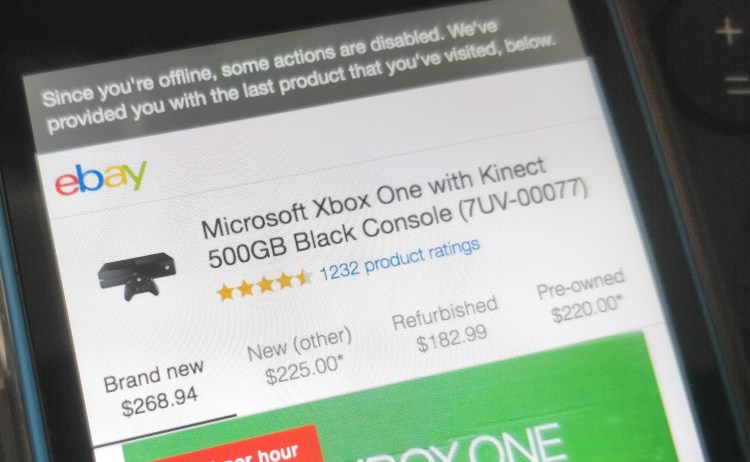While most people in Western markets now enjoy unfettered internet access 24/7, that isn’t the case everywhere around the world. And even in some developed markets, situations may cause your mobile connection to drop intermittently — such as when you travel through a tunnel.
Against that backdrop, eBay has revealed that it’s working on a new progressive web app (PWA) for Android phones, enabling functionality that typically exists in the domain of native apps.
PWAs are basically mobile websites that mimic native apps but offer a number of other benefits, such as being lightweight and requiring less data to operate. This may be key in emerging markets where access to affordable mobile internet is limited and high-end smartphones are prohibitively expensive. Plus, PWAs don’t require installation (which use storage space) or updates.
Native apps have traditionally offered a number of key advantages over standard mobile websites, such as push notifications and offline access. This is where PWAs come into play — to bridge the divide between web and native, giving users the best of both worlds.
June 5th: The AI Audit in NYC
Join us next week in NYC to engage with top executive leaders, delving into strategies for auditing AI models to ensure fairness, optimal performance, and ethical compliance across diverse organizations. Secure your attendance for this exclusive invite-only event.
Progressive
Instinctively, you might think a company would have to rebuild its website almost from the bottom up to make it a PWA, but eBay says otherwise — it’s looking to integrate service worker and PWA technologies into its existing mobile web infrastructure.
“A service worker is like a programmable proxy between your browser and your network,” said eBay engineer and web platform lead Senthil Padmanabhan. “There’s a notion that in order to use these service workers, you need to rebuild your site from scratch as a PWA. But we’re challenging that notion and using service workers instead in our existing website to quickly enhance our current caching, prefetching, and navigational behaviors, as well as providing a network resilient experience.”
So these service workers will help eBay create a cached version of a page when a network connection drops. At first, the offline “mode” will only be available on product pages on Android devices, though the goal is to expand this to the homepage and other associated pages. “This gives us an opportunity to explore network resilient experiences without touching the critical user navigational flows,” added Padmanabhan.
To test this out for yourself, you can check out this Nikon camera product page in Chrome on your Android device, then deactivate your network and hit refresh. However, the broader project is still a work in progress and won’t be properly live until later this year.
Benefits
This all seems like a major overhaul for something that appears minimally useful — it’s not exactly a game-changer like Netflix introducing offline access. How many people really need to revisit eBay pages they’ve previously visited, while temporarily offline? Well, it appears this is less about visiting a page you landed on last week than it is about creating a seamless browsing experience when in patchy internet zones — rather than getting a blank error page when your internet drops, you can still view certain elements of the web page and carry out some tasks until your connection comes back.

Above: eBay’s PWA
So when a shopper lands on a product page, the service worker is enlisted to cache the offline version of the product, along with related resources, such as images. The shopper can still do things like read about the product, check out reviews, compare similar products, and so on. But of course they won’t be able to execute a completely new product search or finalize a purchase. However, they will be able to add an item to their shopping cart so they can complete the transaction when their connection returns.
“The idea is to simplify the flow,” continued Padmanabhan. “We’re making this functionality work agnostic of network, creating a very simple experience so that users don’t have to remember or bookmark the product just to come back later — or wait for the network — and add that item to their cart.”
It’s also worth noting here that “offline access” is just a small piece of the puzzle here — PWAs will enable eBay to offer features through its mobile website that it currently cannot. In the future, the company said that it will explore expanding the functionality of its PWA to include features such as push notifications, while it will also try to improve its pre-caching functionality by enabling it to “predict” what pages a users is likely to visit next and then retrieving the relevant assets in advance. Something like this could significantly improve offline functionality or simply speed up online search.
Padmanabhan told VentureBeat that it could extend offline functionality to sellers, allowing them to do all the necessary spade-work to list an item while offline, and then eBay simply pushes the item live whenever a connection is restored. “For these scenarios we believe that network connectivity should be an engineering problem and not a user problem,” he said.
This all leads us to one other question. Why is eBay exploring these kinds of functionality via a PWA when it already has the ability to do so through its native app, but has chosen not to? It’s not entirely clear why this hasn’t happened yet, but Padmanabhan did confirm to VentureBeat that it is working on similar functionality for the native eBay app on Android and iOS. However, it seems that its mobile website could be given priority here.
“As one of the first ecommerce companies to create this offline experience, this exploration is an important step toward our goal of providing an inclusive experience that is considerate of every user’s network condition,” added Padmanabhan.

